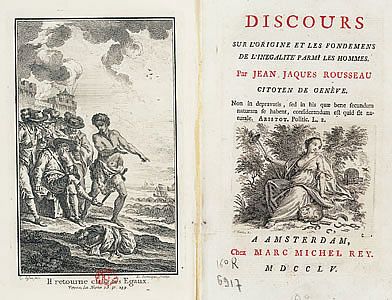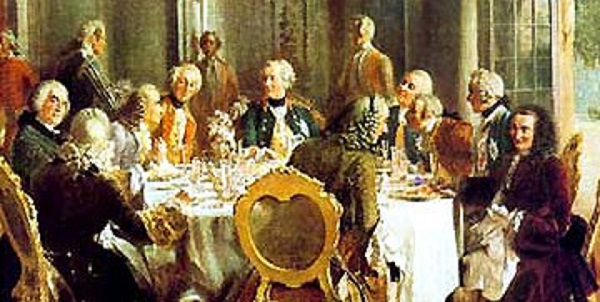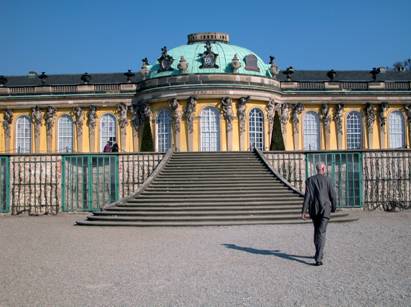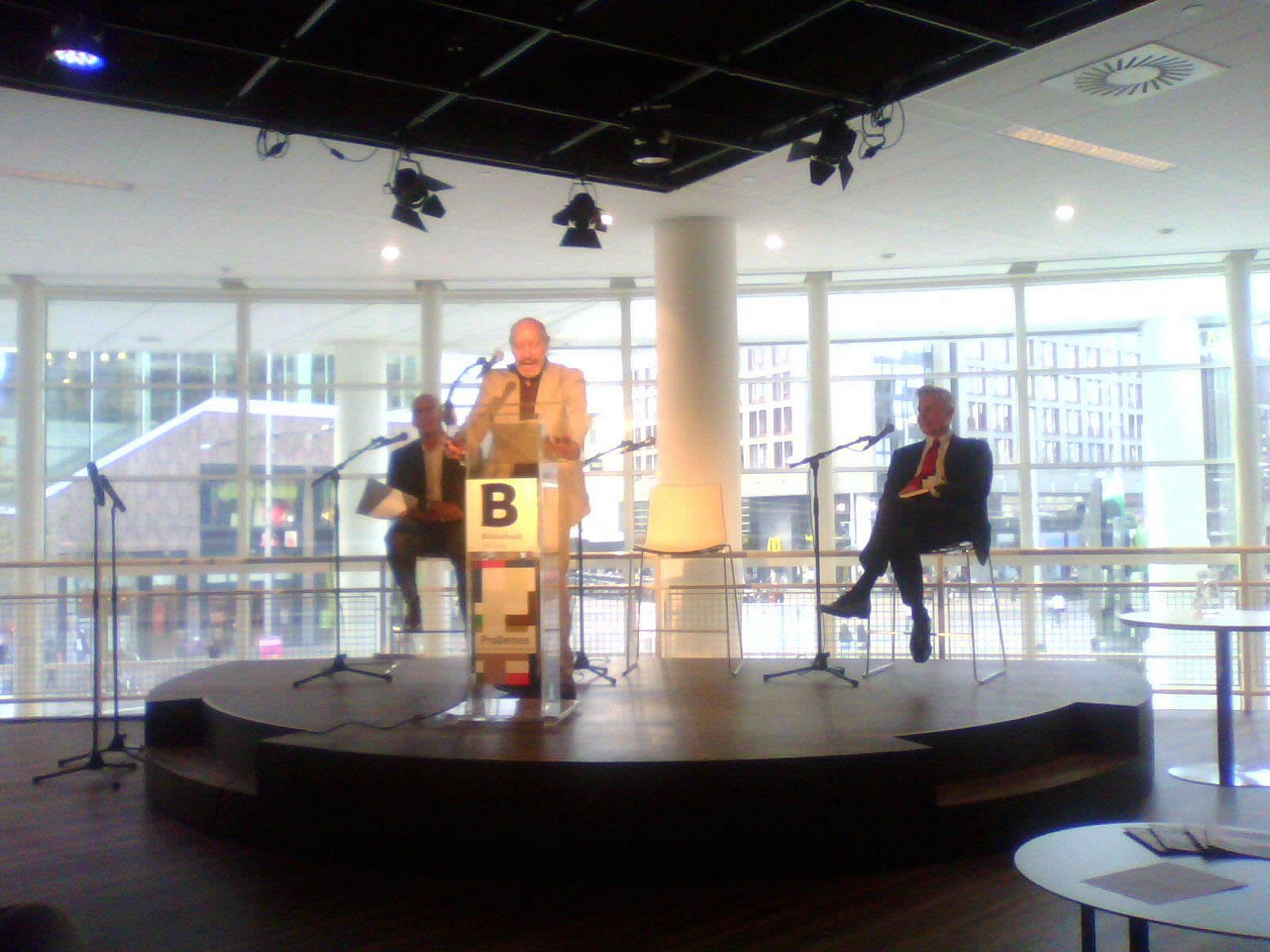

Die Tafelrunde by Adolph von Menzel. The oval domed "Marble Hall" in Sanssouci, the summer palace of Frederic the Great, is the principal reception room of the palace. On the left side, in the purple coat, sits Voltaire; the other guests are Casanova, Marquis d'Argens, La Mettrie, the Keiths, Von Rothenburg, Von Stille and Francesco Algarotti


Aufklärung en Allemagne, Illuminismo en Italie, Enlightenment en Angleterre la pensée des Lumières joue un role fondateur de la conscience européenne. L'Europe des Lumières est un espace à la fois un et multiple, où circulent librement les idées. An escape of mankind out of their own choosen minority: dare to know.
23 September 2011 a debate was organized on democracy and the Enlightenment. Jonathan Israel and 2 professors (1) debated on 'The Radical Enlightenment: The bases of our democracy?' Actual political culture, separation of Church and State, and the relation between élite and people were issues. These issues affects the organization of society: on one side defence of individual freedoms and tolerance and on the other the power of traditions and religions. Enlightenment is at least as important as modern world.
The Age of Enlightenment (or simply the Enlightenment or Age of Reason) was an elite cultural and very complex movement of intellectuals in 18th century Europe, that sought to mobilize the power of reason in order to reform society and advance knowledge. It promoted intellectual interchange, common goals of progress, tolerance and opposed intolerance and abuses in Church and state.
Originating about 1650–1700, it was sparked by philosophers Baruch Spinoza (1632–1677), John Locke (1632–1704), and Pierre Bayle (1647–1706) and by mathematician Isaac Newton (1643–1727) (2). Ruling princes often endorsed and fostered Enlightenment figures and even attempted to apply their ideas of government.
The Enlightenment flourished until about 1790–1800 and it was focussed on functionality and conceived art and beauty as side issues, a personal hobby. The radical Enlightenment is under the impression that reason can only be the slave of the passions. After 1800 the emphasis on reason gave way to Romanticism's emphasis on emotion and a Counter-Enlightenment gained force.
The center of the Enlightenment was France, where it was based in the salons and culminated in the great Encyclopédie (1751–72) edited by Denis Diderot (1713–1784) with contributions by hundreds of leading philosophers (intellectuals) such as Voltaire (1694–1778), who stayed between 1750 and 1753 in Sanssouci, the summer palace of Frederic the Great in Potsdam and who claimed that the continent constituted a kind of great republic divided into several states, Rousseau (1712–1778) and Montesquieu (1689–1755). The movement is to be consider as a mindset, for personal issues and virtues, and for social environment.
Some 25,000 copies of the 35 volume set were sold, half of them outside France. The new intellectual forces spread to urban centers across Europe, notably England, Scotland, the German states, the Netherlands, Russia, Italy, Austria, and Spain, then jumped the Atlantic into the European colonies, where it influenced Benjamin Franklin and Thomas Jefferson, among many others, and played a major role in the American Revolution. The political ideals influenced the American Declaration of Independence, the United States Bill of Rights, the French Declaration of the Rights of Man and of the Citizen, and the Polish–Lithuanian Constitution of May 3, 1791.
Democracy has to be anchored in a constitutional state that not only protects individuals, but also presents space for social relations of cultural and religious nature. Can philosophy serve as one of the acting forces for democracy and underpin to drive our core common values? There have to be a moral order; elements as freedom of expression, opinion, religion and of thought. And, thereafter, institutions have to be established and institutionalized.
There are various types of the Enlightenment, that all interferes and interacts with each other: as intellectual movement; as a cultural period; as a collection of all the ideas; as a subjective mental attitude; as scheduled values.
Some conclusions of the debate: Modern democracy needs more Enlightenment, we have to diminish religious authority if we will institute (liberal) democracy, for a constitution is for the people and therefore of higher level, Enlightenment helps to improve collectivity.
The Radical Enlightement did not fully succeed. Around 1848 the year of the revolutions, great successes were turned by European kings and nobility after the French Revolution. But, although gains of the democratic revolutions were abolished, the Radical Enlightenment also survived as a sort of underground movement that, in spite of repression from authorities, repeatedly pops up. The radical Enlightenment is based upon denial of the idea that social and moral order is coming from a transcedent world. If the order is coming into the world of God, then is rebellion necessarily wrong.
According to Spinoza, we are better of when we recognize our equality and try to cooperate. That is improvement. In such a case, duty of the state is to take care of public good, in which individuals are seen as equal. The radical Enlightenment is a collective process. We are on the right track with the Universal Declaration of Human Rights in 1948, just as with the rise of the European welfare state since the sixties. A better world is not just a matter of less poverty, but also of all political, legal and social freedoms, which stood for Enlightenment. We are still far from such a situation.
Main object is emancipation. Liberation of mankind from traditional forms of authority. Diderot and Rousseau agreed about that. Rousseau wrote: "when all my dreams would become true, it would not be enough: I would still remain fantasies, dreams, desire. I find in me an inexplicable emptiness that nothing will be able to fill". Rousseau then finds the solution in an ecstatic identification with the Supreme Being. The desire for authenticity you would call the current solution. But in both cases it is a false solution, because authenticity is not like that Supreme Being, there is only an infinite, never to gratify desire that ceases only with death. Pursuit of authenticity leads to the contrary, to affectation and deceit.